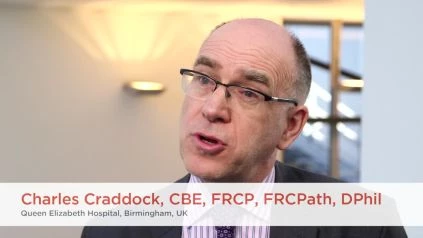Charles Craddock, CBE, FRCP, FRCPath, DPhil, from Queen Elizabeth Hospital, Birmingham, UK explains how the definition of elderly is less dependent on chronological age but instead biological age in acute myeloid leukemia (AML). Consequently this implies that intense chemotherapy and transplants may be suitable in fit patients up to the age of 70, whereas in younger patients with co-morbidities treatment is associated with greater risks. However molecular complexities is significantly greater in old patients with AML thus there is a higher risk of relapse after intensive chemotherapy, therefore treatment strategies must be tailored. Prof Craddock also discusses the important role of azacitdine in older patients who are not fit for intensive chemotherapy, and how research into augmenting the anti-leukemic effect of azacitdine will be important in the future.
Recorded at the 2016 Annual Meeting of the British Society of Haematology (BSH) and International Society of Hematology (ISH), held in Glasgow, Scotland.
[the_ad id="32629"]

